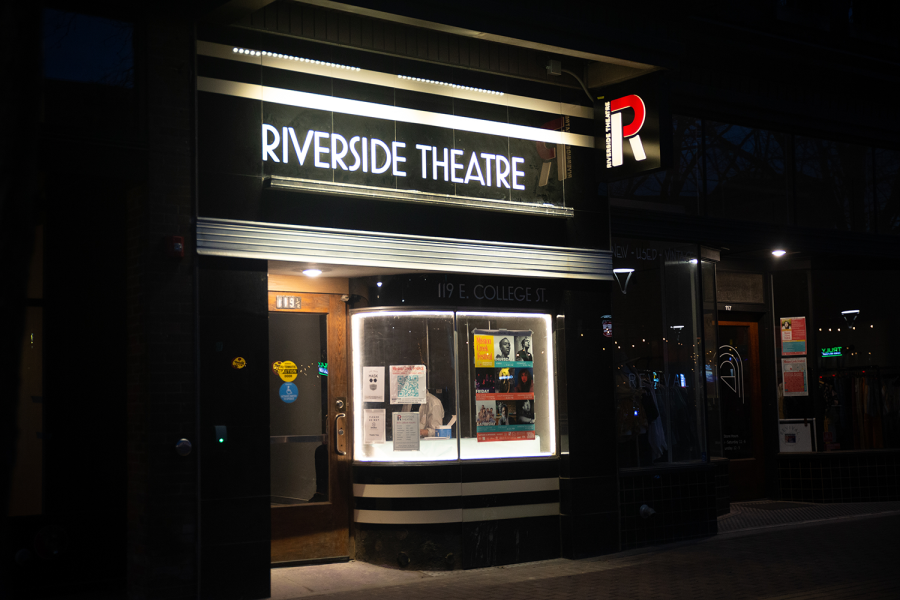Riverside Theatre’s ‘Will Power’ workshops help high school students learn Shakespeare
Under the new leadership of Riverside Theatre’s education coordinator Kathleen Johnson, Riverside’s “Will Power” education program has begun to implement workshops in high school classrooms that help students learn and engage with Shakespeare.
The outside of the Riverside Theater is seen during day three of the Mission Creek Festival in Iowa City on Saturday, April 9, 2022.
January 24, 2023
Since 2000, Riverside Theatre in downtown Iowa City has engaged students in the Iowa City School District with the classic works of William Shakespeare through an educational program called “Will Power.”
As of fall 2022, the program has been led by its new education coordinator Kathleen Johnson. When she applied for the position, she pitched the education concept that has changed the way “Will Power” engages with schools.
“We were finding that a lot of teachers were first tackling Shakespeare now in high school,” Johnson said. “What we do now is we are training our teaching artists to be prepared to go into classrooms throughout the year when the teacher is instructing their Shakespeare unit.”
This new concept introduces interactive workshops to students reading Shakespeare’s texts, allowing them to better appreciate both the literary genius of Shakespeare and the power of his texts in performance. There is a large variety of workshops, each one dedicated to a Shakespearean play.
The most recent “Will Power” workshop occurred in December 2022 in a ninth-grade English class taught by Schuyler Fynaardt at Liberty High School in North Liberty, Iowa.
Over the course of three days, teaching artists entered the classroom and encouraged students to participate in theater exercises that helped them interact with “Romeo and Juliet,” the Shakespeare text they were reading.
One teaching artist, professional actor Monté Howell, wanted to help students experience the play as well as study it. He described it as engaging the creative side of the brain as well as the logical side.
“Their understanding is very much sitting down, possibly reading scenes in class or having it as reading assignments, and we take that left side of their brain, and we give it a little bit of break, and we use the right side, the creative brain, to bring this to life and to give them a different experience,” Howell said.
RELATED: Review | Riverside Theatre’s ‘Chipmunk’d’ melds comedy with existential dread
Howell applied for his position in the program because he wanted to stay involved with Iowa City’s theater community. He said he believes the workshop is a great learning tool. Previously, he performed in Riverside’s production of “Henry V” in summer 2022.
“I think it’s helpful in the way they’re learning Shakespeare, and they’re getting better at Shakespeare and seeing these words and having different sensory experiences with them, but they’re also exercising teamwork and listening to one another and having to collaborate,” Howell said.
Before the workshops started, the Liberty High School Shakespeare curriculum consisted of reading Shakespeare for the benefit of understanding the text.
Shakespearean language, or — as Fynaardt affectionately calls it — “the code,” is often very difficult for high school students to comprehend.
The “Will Power” workshop incorporated movement into “Romeo and Juliet,” which allowed students to learn the play visually and physically.
Fynaardt said the first day of the workshop focused on warm-ups that coaxed the students out of their comfort zones.
On the second day of the workshop a week later, the students were divided into small groups and tasked with reading a scene from the play. They performed these scenes on the third workshop day after rehearsing with the teaching artists.
Fynaardt enjoyed the workshop and looks forward to more workshops in the future that focus on different Shakespearean plays.
“I think [the workshop] did a really good job of making the text a little more real, a little more tangible,” Fynaardt said. “And they learn to work with other people, people they don’t know as well, and try something new.”















